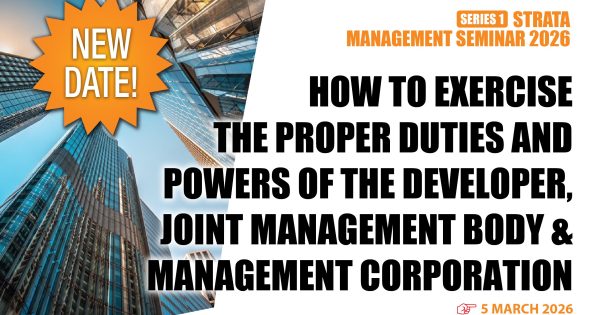
Case update: Target Term Sdn Bhd v Waldorf and Windsor Management Corporation and another appeal [2024] MLJU 2846
Facts:
Malaysia Land Properties Sdn Bhd (referred to here as “Mayland”) was the developer of a mixed development complex in Taman Sri Hartamas, Kuala Lumpur, within which were comprised the Waldorf & Windsor Towers apartments. In 2009, Mayland entered into a sale and purchase agreement to sell to Target Term Sdn Bhd (“Target Term”) one of the apartment units, unit B-21-03. The sale included 420 carpark units. Target Term and Mayland were actually controlled by the same ultimate beneficial owner.
The sale to Target Term of the single apartment unit together with the 420 carpark units was in furtherance of a plan for Target Term to undertake a commercial carpark business. The strata title to unit B-21-03 was issued to Target Term on 19 March 2018. In the strata plan, 414 carpark units have been accessorised to the parcel identified as unit B-21-03.
In 2017, Waldorf and Windsor Management Corporation (“MC”) billed Target Term for arrears in management charges and sinking fund contributions amounting to over RM850,000.00. This prompted Target Term to file a suit against the MC in June 2017.
Claims:
Target Term Sdn Bhd:
- Amongst others, a declaration that the back charges from the MC were null & void.
Waldorf and Windsor Management Corporation (Counterclaim):
- Sought to defeat the title of Target Term to the accessory parcels on the basis that (amongst others) the SPA contravened the applicable provisions of the Strata Titles Act 1985.
Issues:
2 issues determined by the Court of Appeal are as follows:
1st issue: Whether the act of operating a commercial carpark business on the accessory parcels constitute dealing in those accessory parcels, and accordingly contravene the statutory prohibition in sections 34(2) and 69 of the Strata Titles Act 1985 against independent dealing of accessory parcels?
2nd issue: Whether the back charges imposed on Target Term Sdn Bhd by the MC were null & void despite the fact that at all material times, the carpark parcels were maintained by Target Term Sdn Bhd and not the MC?
High Court Decision:
- The carpark units were not accessory parcels but were common property;
- The use of the 414 carpark parcels in the commercial carpark business undertaken by Target Term contravened sections 34(2) and 69 of the Strata Titles Act 1985; and
- The provisions of the Strata Titles Act 1985 require an accessory parcel to be used in conjunction with the parcel to which they have been accessorised (B-21-03), and since they not used in conjunction with unit B-21-03, this illegality defeated the title of Target Term to the 5 carpark parcels, which in turn meant that the carpark units were common property within the meaning of Strata Titles Act 1985.
Court of Appeal:
1st issue: The Court of Appeal were of the view that the act of operating a commercial carpark business on the accessory parcels does not constitute dealing in those accessory parcels, and accordingly does not contravene the statutory prohibition in Sections 34(2) and 69 of the Strata Titles Act 1985 against independent dealing of accessory parcels.
The Court of Appeal takes into consideration of the Federal Court decision in Innab Salil v Verve Suites Mont’ Kiara Management Corporation where Tengku Maimun CJ summarised the applicable test to distinguish between a tenancy and a licence.
The Court of Appeal by applying this test to the facts of the present case, had no doubt that the permission granted to a driver of a motorcar to enter into, and park in, the area designated as a carparking area for visitors would constitute no more than a licence and cannot be construed as a tenancy. The accessory parcels constituted the carpark units cannot metamorphose into common property as the term common property is defined by way of exclusion in the Section 4 of Strata Titles Act 1985 where the common property is that which is not identified as a parcel in the strata plan.
Whereas accessory parcel is defined in section 4 of the Strata Titles Act 1985 as any parcel shown in a strata plan as an accessory parcel which in this case, the certified strata plan that has been exhibited in evidence clearly shows the 414 carpark units being identified as being accessory parcels. As such, the carparks cannot be construed as common property.
2nd issue: The Court of Appeal found that Target Term Sdn Bhd was liable to pay the back charges as imposed by the statute.
The Court of Appeal are of the view that Target Term Sdn Bhd would not be permitted to circumvent a liability that has been imposed by statute. There is nothing in the scheme of the applicable legislation to suggest that a proprietor and a management corporation can contract out of the obligations imposed by written law. As such, the contention by Target Term that it had undertaken its own maintenance of car park accessory parcels does not obliviate its liability to pay for the charges that have been imposed under the Strata Titles Act 1985 and under the Strata Management Act 2013.
Key Takeaways:
The act of letting out of a carpark unit as part of a business merely amounts to a licence to the carpark customer to use a unit of carpark, it does not amount to an act of dealing in the accessory parcels comprising the carpark units. For this reason, there was no contravention of the prohibition against independent dealing of accessory parcels contained in sections 34(2) and 69 of the Strata Titles Act 1985.
In any event, proprietors are required under statue to pay maintenance charges and sinking funds and whenever a management corporation has refused to provide maintenance services when it is legally obliged to do so, it would be open to a proprietor to seek legal redress to compel the management corporation to provide such services. In addition, if the management corporation has refused to provide maintenance services and a proprietor has incurred costs in engaging a third-party contractor to perform such services, such costs would be recoverable from the management corporation.


